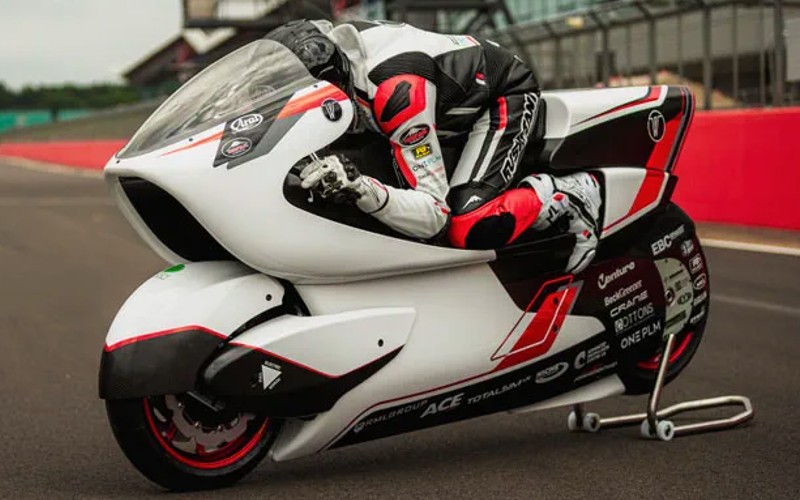Over £50 million of government funding has been awarded to 30 cutting-edge manufacturing projects including rapid-charging motorcycles and self-driving cars, cementing the UK as the best location in the world to manufacture.
The funding will boost the UK’s innovation of clean, green technologies, helping to create jobs and grow the economy.
£11m of government grant funding through the Advanced Propulsion Centre (APC) is being awarded to 12 fast-start projects aiming to accelerate product development of motorcycles, buses, cars and more. With industry match-funding, projects will receive a total of £22.7m to develop innovative automotive products within 12 months.
Winners include White Motorcycle Concepts (pictured), who are developing a fully operational, rapid-charge first responder motorcycle for use by emergency services, Dolphin N2 who are creating a tractor fuelled by hydrogen made on the farm from renewables, and Wrightbus who are accelerating the development of zero-emission hydrogen fuel-cell electric coaches.
Minister for Industry and Economic Security Nusrat Ghani said: “The UK automotive sector is at the cutting edge of exploiting innovative technologies. These have the potential to create jobs, grow the economy and accelerate how we reach net-zero.
“This package of funding will help industry and government work together and take decisive action in targeting areas where the UK is leading the way.”
Acknowledging the huge potential of self-driving technologies, the Centre for Connected and Autonomous Vehicles (CCAV) is also providing £18.5m of R&D grant funding for 43 British companies. 13 projects are developing self-driving technologies, products and services ready for the Fourth Industrial Revolution and transforming the ways people and goods are moved across the nation.
Winners include Wayve who are developing methods to evidence the safety of AI in self-driving technology, supporting our work to ensure self-driving capabilities are safe, Nissan who are further developing their self-driving capability in towns and cities, and Zero Point Motion who are developing a revolutionary automotive sensor that will change how self-driving vehicles position themselves in the real world.
The Faraday Institution will also invest £19m in four key battery research projects and drive innovation. The projects include Nextrode that is focused on developing new ways to manufacture electrodes (an important battery subcomponent) to make batteries cost less and perform better, and NEXGENNA, aiming to improve the performance of sodium-ion batteries – a technology with significant advantages around sustainability, safety and cost.
The Faraday Battery Challenge (FBC), delivered by Innovate UK, has awarded £3.2m to three leading universities to help the UK’s regional battery industries by addressing their skills needs. This will ensure that the UK becomes a leader in the shift towards electrification and maintains a strong global position in the industry.
The FBC has awarded £700,000 to Coventry University to lead a group that will create the National Electrifications Skills Forum and Framework (NESFF). The NESFF will support the UK’s manufacturing competitive advantage in electrification by ensuring that the right skills are identifiable and accessible across sectors and nations.
University College Birmingham and Newcastle University will each get a share of £2.5m to run the Battery Workforce Training Initiative in their local areas.
£5.5m will also be used to establish a Medicines Manufacturing Skills Centre of Excellence, boosting the training provision needed to support growth, create jobs, and respond to future health emergencies.


